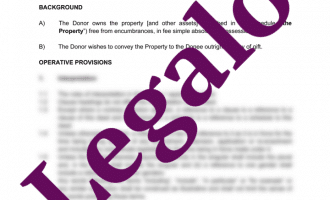Deed of Gift
Our Deed of Gift template:
- Over 400 sold!
- Easy-to-use template for UK use
- Use to make a lifetime gift of property or money
- Full guidance notes included with the purchase
- Drafted by an expert UK Solicitor for reliability
- Complete your Deed of Gift within 15 minutes

How Does It Work?
-
1. Download
-
2. Edit
-
3. Print
-
4. Sign
Our Deed of Gift template is for use in the UK. The deed can cover gifts of money, property and other assets, such as land and buildings.
Now over 400 Deed of Gift templates sold!
This document enables you to gift assets to someone during your lifetime. If you instead want to make a gift that takes effect when you die, do so in your Will.
You can use this deed of gift to transfer by way of gift any type of asset, for example:
- money;
- property (land and / or buildings);
- shares;
- other investments; or
- other assets.
For example, you can use this where mum and dad are making a cash gift to a child to help them buy their first house. Often in this situation, the lawyer doing the property conveyancing will ask mum and dad to sign a document to confirm the cash is not a loan, but an outright gift.
Another common situation is where parents gift a property or shares to their children.
Legalo’s deed of gift template is ideal for any of these gifts. David, one of our founders and a UK practising solicitor, has drafted our template. Using our precedent template is a far more cost effective alternative to using a local solicitor.
Our deed template costs just £29.95. You can expect to pay between £350 and £500 plus VAT if you were to use a traditional local solicitor.
Your signed Deed of Gift will confirm the binding legal status of the gift. If you make a gift and you don’t record it in a deed, then it is not legally binding. This is because it lacks what is known as ‘consideration’ to make the arrangement legally binding. In the absence of consideration, you must record the arrangement, or in this instance the gift, in writing as a deed.
Completing the Deed of Gift Template
To complete the document template, simply download the precedent in Word format and edit to suit your specific needs. We have included full guidance notes with the download, and the average time taken to complete the document is less than 15 minutes.
If you have any questions when you come to complete the precedent that the guide does not cover, then please call our free customer support line.
As a gift, the transfer of the assets must not come with strings attached, be subject to any payment or payment-in-kind, or for the exchange of assets, nor must any property be subject to an outstanding mortgage debt (otherwise it will incur SDLT – see below).
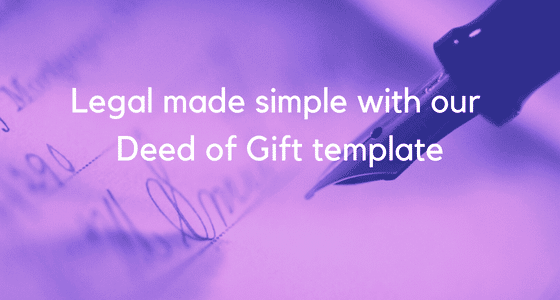
Tax Considerations on Deeds of Gift
If you make a gift of an asset of value, for example, money or property, and then die within 7 years, then Inheritance Tax may be payable on the gift.
This is because HMRC will add the value of the gift back to your estate for the purposes of calculating your estate’s liability to Inheritance Tax. If you survive the 7 years, then there is no such extra tax to worry about.
In each tax year a person has a non-taxable gift allowance for Inheritance Tax purposes. The amount of the allowance is currently £3,000 per year.
Beyond this amount, if the value of all gifts made within 7 years prior to your death take the value of your estate over the tax-free allowance (starting at £325,000 as at July 2024) then inheritance tax will be payable on the gift by the estate. Inheritance tax is currently 40% on the amount over the tax-free allowance.
A relief known as taper relief may apply where the gift is older than 3 years which might bring down the tax if the total value of gifts in those last 7 years exceeded your nil rate band. For more on how this takes effect on your deed of gift, read our blog post on the 7-year rule on gifts. For additional information, read the guidance on the Government website.
Gift with reservation of benefit
If you make a gift, for example, of your home or part of it, but you remain living there, then this is called a “gift with reservation of benefit”. It is ineffective for Inheritance Tax purposes and will still count as owned-wholly within your estate.
The same applies if you make a gift of an investment property but you reserve the income from it for yourself, perhaps because you need the income to live on. Again, you have made a gift with reservation of benefit.
A gift with reservation of benefit of your home will also be ineffective against future care home fees.
You can read more about HMRC’s rules on what a gift with reservation of benefit is and how it affects Inheritance Tax here:
https://www.gov.uk/hmrc-internal-manuals/inheritance-tax-manual/ihtm04071
Deed of Gift v Deed of Variation
If you have received an inheritance and within 2 years of the date of death of the person it was received from you wish to make a gift of some or all of it to someone (such as your children), then use our Deed of Variation instead of this deed of gift.
Using a deed of variation in such a situation has potential UK inheritance tax advantages.
Deed of Gift of Money
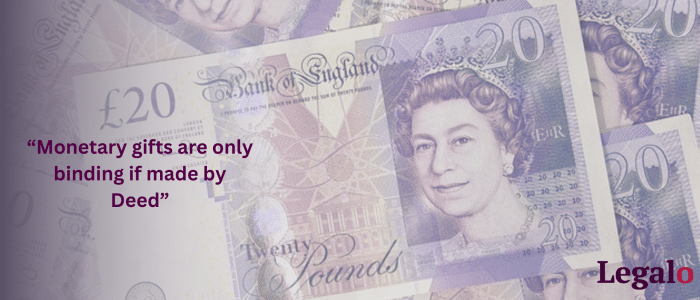
Money is the most common asset that people here in the UK make gifts of. For the gift to be binding, and non-revocable, you will need to put in place a Deed to record the gift.
Unlike other assets, such as property and shares, there are no additional requirements other than executing a deed of gift for the money.
People are often concerned that money received by gift is subject to income tax. As at 22nd July 2024 it is not. You can read information on the Government forum for confirmation of this.
There is no law that limits the amount of money that you can gift to another person. Since any tax liability that does arise is the obligation of the deceased’s estate, the recipient of the cash does not need to concern themselves over future potential Inheritance Tax liability.
For peace of mind, we always encourage our readers to put in place a legally binding Deed of Gift when making any significant cash gift, even where it is made between family.
Companies Making a Deed of Gift

A company is able to make a gift in the same way as an individual. However, unless the gift is to a charity, it is very likely to give rise to tax implications. If you are considering putting a Deed of Gift in place to cover a company gift, we recommend that you obtain tax advice before making any gift.
While companies can make gifts to charities without any issues, gifts that are not to charities cause 2 problems for companies.
Firstly, trying to transfer property out of a company to a person or other body that is not a charity is likely to attract tax (usually as a taxable benefit-in-kind – income tax and national insurance).
Secondly, companies are supposed to make profit for their shareholders and so cannot simply give their assets away: it is against their fundamental purpose.
As a result, the directors making such a gift could be held personally accountable to the shareholders for such losses.
Additional Legal Transfer Formalities for Gifted Assets
When gifting certain assets it is necessary to enter into a legal transfer document in addition to the Deed of Gift. The deed will record the nature of the transfer and provide evidence that it was made as a gift, but it will not formally transfer the legal title.
There are two commonly gifted assets to which this applies. They are:
- Gifted property (i,.e. land or buildings); and
- Gifted shares in companies
We consider below the additional formalities that are required to conclude (i.e. register) the legal transfer of these two types of assets when gifted.
Transfer of Property by a Deed of Gift

To complete the transfer of the property as a gift you will need to register the transfer of the property at the Land Registry, and complete a transfer form for the property.
The relevant transfer forms are available free of charge from the Land Registry website.
Depending on whether you have gifted all or part of the property as a gift, you will complete either the TR1 (Transfer of Whole) or TP1 (Transfer of Part) forms. Along with theTR1 or TP1, you will also need to file (a) an AP1 form, and (b) an ID1 form for each party to the transfer who is not using a solicitor.
For the Id1 forms you need to see a lawyer and get them to certify your ID. For this we suggest you try a local notary public rather than a solicitor, as the solicitors are often reluctant to do the work but the nataries are usually much more helpful.
To find a notary local to you, just put your postcode into this website:https//www.notariessociety.org.uk.
In addition to completing the TR1 or TP1 at the Land Registry, you may also need to file an SDLT return (see below), but normally you would not have any SDLT to pay on a gifted property.
Transfer of Shares by a Deed of Gift
If you gift shares to another person, then you will need to complete a Stock Transfer Form in addition to the Deed of Gift. A stock transfer form is the legal document which transfers the legal title in the shares once they are gifted.
You can download a template Stock Transfer Form for free from many sources on the Internet. We recommend First Formations Stock Transfer Form.
Ordinarily, when shares are transferred, stamp duty is payable at the rate of 0.5% of the price paid for the shares. However, in this instance as the gift is by nature for nil value, then no stamp duty is payable. Of course, as with all gifts of assets that have a market value, the 7-year rule for the purpose of inheritance tax still applies.
Transfer of Land Subject to a Mortgage Debt
If land is subject to a mortgage, it usually means that you cannot transfer it. If you get the bank’s permission, they might allow it, but this is very rare.
Normally, they would have the old mortgage discharged and a new one arranged, rather than allow the (more simple) transfer of the property subject to the mortgage.
You will need to contact your bank to discuss your personal position if you are looking to transfer a mortgaged property by way of a gift.
If you do manage to transfer the property subject to a mortgage, then HMRC will charge you Stamp Duty Land Tax on the value of the outstanding mortgage and you will need to file an SDLT return.
Transfer of Money & Insolvent Deeds of Gift
If you are an undischarged bankrupt, you cannot make any significant gifts.
If you have outstanding debts or liabilities, you cannot make gifts of money or other property that would mean you are unable to pay your debts: this would be unfair to your creditors, and, as a result, the Insolvency Act 1986 may make the attempted deed of gift invalid.
The same applies to making gifts of cash or property in order to remove them from your ownership to put them beyond reach of creditors. The Insolvency Act states that such gifts can be cancelled.
Making gifts when you are doing so in order to become, or remain, eligible for Benefits is also illegal and would be considered to be benefits fraud, which is a criminal offence.
Do not make a gift in any of these situations. Also, do not put material assets into trust for someone or divert a material inheritance by a deed of variation if you are (a) bankrupt, (b) cannot pay your debts or (c) are on Benefits, as these each amount to the same action.
Should you be using a Deed of Variation instead of a Deed of Gift?
If you have received an inheritance and within 2 years of the date of death of the person it was received from you wish to make a gift of some or all of it to someone (such as your children), then use our Deed of Variation to gain potential UK inheritance tax advantages.
Retaining the Right to Income on a Gifted Asset
As another comment, you should not gift an asset, such as property, to someone, but expect to retain the right to the income arising from it.
For example, income such as rent on a property, dividends from shares or interest from money gifted and put into a bank account. The future income arising would belong to the new owner from the date it was gifted to them.
The only way around this is where you control a company, perhaps owning all, or a majority, of the shares, and you transfer some of the shares to someone else, but turn them into a different class of shares.
In that situation, you can control the issue of dividends if you retain control of a majority of the shares. So, in this way, you can gift some asset value, but retain the full income value.
FAQs on Deeds of Gift
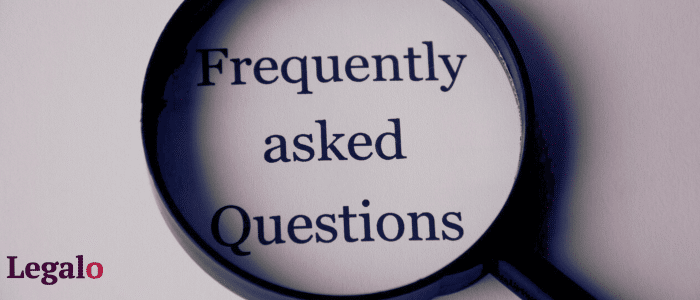
Deeds of Gift are one of our most frequently sold documents. Despite the document being very simple, we get a moderate number of questions from people due to the important nature of the document.
We have answered popular questions from the Internet below about deeds of gift.
Can I do my own Deed of Gift?
Yes, you can write your own Deed of Gift if you want to. However, here at Legalo we have done the hard work for you.
We provide a deed of gift template that you can tailor to your personal needs.
You also get peace of mind in knowing that an experienced English law solicitor has drafted the template precedent.
How do you write a gift deed?
The document must provide details of the parties involved in the gift and the nature of the gift, be that money or property.
It is critical that the person making the gift signs the deed and that an independent person sees them sign their signature (“witnessing”). It is common for both parties to sign the deed in the presence of a witness.
As we have mentioned above, we have prepared this document with all the relevant details, which ensures peace of mind.
Do you need a solicitor for Deed of Gift?
You can use a solicitor to prepare a deed of gift. If you do use a solicitor, expect to pay between £350 and £500 plus VAT.
Alternatively, at Legalo we have prepared an easily-accessible document that will only cost you £29.95. It has also been written by a solicitor. In this case one of our Co-founders, David.
You can get a document that you can rely on, at a fraction of the cost of using a firm of solicitors.
Who signs a deed of gift?
The signatory to the deed of gift must be the party involved in making the gift, so the person giving the gift (the donor). To be legally valid, the person making the gift must sign the document.
Who can witness a deed of gift?
A witness must always be an independent party. The witness should not someone who has anything to gain or lose from the gift. The witness should be aged 18 or older; and preferably not related to the signatory. You do not need any sort of lawyer to witness the deed of gift.
Should a gift deed be notarized?
A deed of gift does not need to be notarized in the United Kingdom. You merely need to have the parties sign it and witnessed, by an independent witness.
How much does a Deed of Gift cost UK?
At Legalo, we only charge you £29.95 for our deed of gift template. What a bargain! You can use it multiple times at no further cost. This compares to a cost of between £350 and £500 plus VAT if you use a traditional solicitor.
What makes a deed of gift valid?
To be legally valid, the Deed of Gift must be in writing. At least the person making the gift must sign it. The signature must be witnessed. The written guide that comes with our template tells you exactly how to do this.
Does a deed of gift need to be registered?
No, unless it is a gift of land, property or shares. Then, for land or property, you would need to register the new owner of the land or property with the Land Registry using the TR1 or TP1 form, an AP1 form and ID1 forms for any party who is not using a solicitor. See the Land Registry’s website for full details and for the forms needed.
For a gift of shares where you hold a physical share certificate, you would also need a stock transfer form, so you can submit that to the relevant company for registration.
Stock transfer forms are available free of charge on the Internet from various sources. You will need to transfer digitally-held shares digitally. So you should check with the company concerned as to how you do that.
However, whatever the nature of the gift, you should retain a copy of the deed of gift somewhere safe, in case anyone ever questions the ownership of the asset or the date you made the gift.
For example, HMRC might want to see that you did not gift it within 7 years before you pass away. Otherwise, you have to take it into account in your estate for Inheritance Tax purposes, if it is over the annual exemptions. See our blog article on this.
How long does a deed of gift take?
While you might need to wait a couple of weeks or more for a solicitor to draft a deed of gift for you, with Legalo’s instant service, you can download your template as soon as you have purchased it.
Then you can complete it in just a few minutes. The average document drafting time when using our template deed of gift is around 15 minutes.
What are disadvantages of gift deed?
If you make a gift, you cannot take it back just because you change your mind later on.
There can be a potential disadvantage if you make a gift to a descendant, such as your child, who marries and later divorces. The gift forms part of the couple’s joint property. You would expect that the court would be divide it between them as part of their assets.
There would be an exception to this if they had a pre-nuptial or post-nuptial agreement. It would specify that the asset was:
- for the child to retain; and
- not count towards their joint asset total.
In the earlier scenario, it might have been better to put the asset into a trust, the beneficiaries of which were:
- the child; and
- any children and grandchildren, etc they have.
What are the legal requirements of a gift UK?
There are three legal requirements for a Deed of Gift in the UK. These are:
- The Deed must be in writing;
- The parties to the Deed must sign it; and
- All the signatures to the deed must be witnessed.
A true gift is one that is outright. This means that the person giving the gift does not:
- retain use of the asset gifted; or
- receive payment or anything of value or benefit to them in return.
The exception to the first point is if, say, you gift half of a property, then you still have full use of the property.
If you gift the whole of a property, then you must not retain use of it without paying a market rate of rent to the new owner.
If you contravene this, then HMRC can add the asset back into your estate for Inheritance Tax purposes.
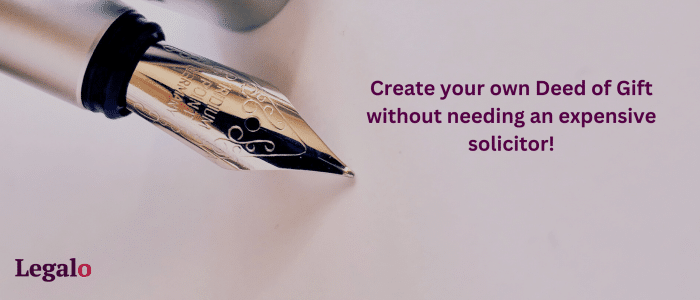
Clauses in this Deed of Gift
The template comes with a full written guide to help you fill it in quickly and easily. Below is an excerpt from the guide, showing the main points.
We have deliberately kept this template short and simple. It really does not need to be any more complex than that.
1. Interpretation
Normally this clause defines the main terms used in the deed. In this case, as the document is very simple, it just sets out some legal rules of interpretation.
2. Transfer by way of gift
This is the main clause which states that you made the gift. You should set out the assets you are gifting via this deed of gift clearly in the schedule.
3. Stamp Duty and Stamp Duty Land Tax on gifts
If you make the gift of property subject to a mortgage, then SDLT will be due. So if this applies, then you may need to amend or delete clause 3.1. If the gift is not in fact an outright gift, but is in exchange for anything of any value, then it will not be free of stamp duty or SDLT. If the gift is simply cash, feel free to delete this whole clause.
4. Warranties by the Donor
We have included some warranties that the donor owns the asset(s) they are gifting, etc. Most of these are more suitable where you are gifting property. Delete any that do not seem relevant to your situation. If the gift is simply cash, feel free to delete this whole clause.
5. Gift Deed Entire agreement
This clause limits the parties’ reliance on representations and warranties (i.e. anything said or in writing before you sign the deed) that you are not including in the deed.
6. Rights of third parties
This clause excludes the Contracts (Rights of Third Parties) Act 1999 from applying to the Agreement. So this means that only the parties to the Agreement can enforce it.
7. Deed of Gift law and jurisdiction
If any party is based abroad, you may wish to change the jurisdiction clause to reflect this. Also make it non-exclusive.
Where the donor lives in the UK, the jurisdiction should be exclusively in the relevant part of the UK, e.g.:
- England (covering England and Wales);
- Scotland; or
- Northern Ireland,
as applicable (change it if need be if it is not England or Wales).
The Schedule in the Deed of Gift
As mentioned above, you should list the assets you are transferring in the schedule, such as:
- freehold or long leasehold property;
- bank accounts;
- cash (state the cash amount);
- shares; and
- other investments.
If there are a lot of shares in various companies, you could describe them in general terms, rather than listing them individually.
Alternatively, refer to a separate list where they are all detailed. When the freehold property is only a part share of a property, then set out the percentage share.
If the property is subject to any mortgage then set out the current level of mortgage debt for which the recipient is taking over responsibility.
You should identify the property by its title number (if registered property) and by its full postal address.

With the benefit of our guide and template, creating your Deed of Gift, whether for money or property should take you less than 15 minutes.
